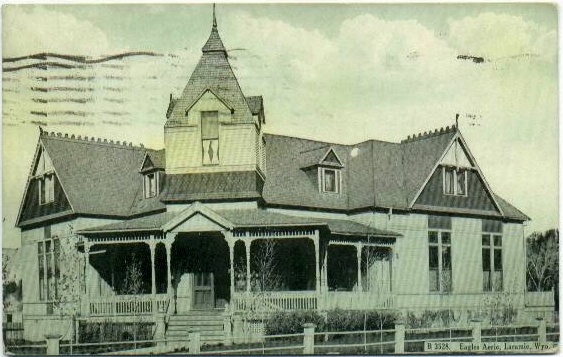
Laramie Eagles Aerie, 1910
Below left, Grand Avenue, 1920's
For discussion of the Fraternal Order of Eagles see
Cheyenne III.The photo of Grand Avenue was taken by Henning Svenson in the 1920's. For discussion of
Svenson see next page.
The location and the name of the City of Laramie were selected by Gen.
Grenvile M. Dodge, chief engineer of the Union Pacific Railroad, , photo to the right. By the time the first train
reached Laramie on May 10, 1868, , photo to the right. By the time the first train
reached Laramie on May 10, 1868,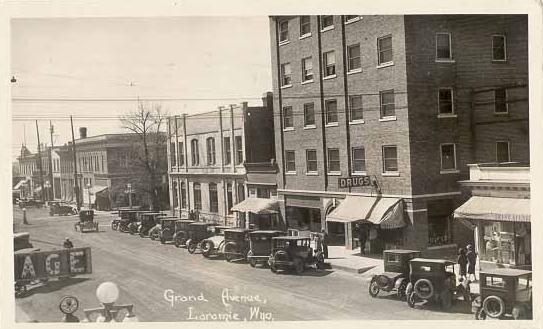 Laramie was a thriving tent and shack city of approximately 2000 population with
a male to female ratio of six to one, 23 saloons, not counting
hog ranches and parlor houses, 1 hotel, no churches, and a reputation for being a bit rough,
Lucius Morris Beebe, the bon vivant and wit, referring to it as a "suburb of Hell". The first church services were conducted
in a general store owned by Edward Ivinson, who had arrived with his wife Jane on
the first passenger train. Laramie was a thriving tent and shack city of approximately 2000 population with
a male to female ratio of six to one, 23 saloons, not counting
hog ranches and parlor houses, 1 hotel, no churches, and a reputation for being a bit rough,
Lucius Morris Beebe, the bon vivant and wit, referring to it as a "suburb of Hell". The first church services were conducted
in a general store owned by Edward Ivinson, who had arrived with his wife Jane on
the first passenger train.
With the coming of the railroad, Laramie became a shipping point for northern Colorado. In 1876, a
road was constructed from Laramie through Woods Landing to Walden in the North Park section of
northern Colorado. Thereafter until construction of the Laramie, Hahns Peak and Pacific Railroad in 1911
( photo of LHP&P depot in Fox Park, Wyo., lower right),
all supplies for North Park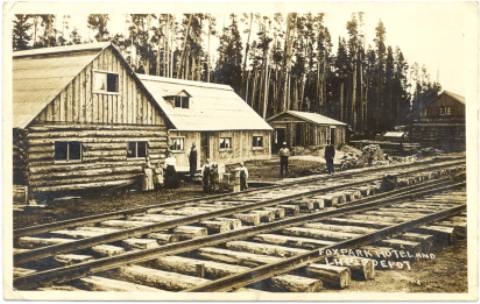 were brought in by double and triple wagons pulled by 12 or 14 horse teams.
For photos of similar rigs, see Buffalo page.
Notwithstanding the road, Walden, in part due to its isolation, remained small. In 1887, the entire town
turned out for a photo, 17 people, one dog, two flower pots, six buildings and the
town pump. The Feb. 7, 1907, issue of the Walden New Era paid a tribute to one of the stage drivers: were brought in by double and triple wagons pulled by 12 or 14 horse teams.
For photos of similar rigs, see Buffalo page.
Notwithstanding the road, Walden, in part due to its isolation, remained small. In 1887, the entire town
turned out for a photo, 17 people, one dog, two flower pots, six buildings and the
town pump. The Feb. 7, 1907, issue of the Walden New Era paid a tribute to one of the stage drivers:
Sid Lawrence, who drives the Laramie end of the Laramie-Walden stage line,
making the trip from Laramie to Wood's Landing,
a distance of 27 miles, and return has been on the route for thirteen years
straight. A record such as his needs no comment. A man who can put in
thirteen years in one position, and especially that of driving a stage
through all kinds of weather across the Laramie plains, where the wind
blows 400 days out of the year, sometimes with a speed and force that turns
over wagons, miles of barbed wire fence, etc. is deserving of more credit
than a pen is sufficiently eloquent to portray.
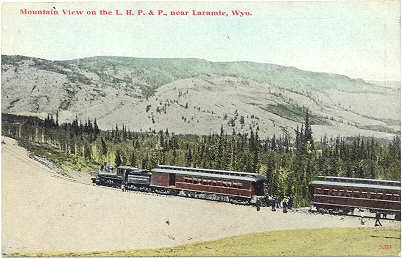
Laramie, Hahns Peak and Pacific RR near Laramie
On October 17, 1911, the first train on the
L.H.P. & P., known by locals as
the "Long Hard Pull and Perhaps," reached Walden from Laramie. In the 1930's the line
was absorbed by the UPRR, later to be spun off as part of the Wyoming-Colorado. Service
has now been discontinued, the tracks pulled up and the rolling stock sold to
a line in Arizona.
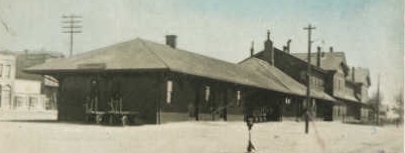
Union Pacific Depot and Hotel, 1910
The depot depicted above and at the end of the street in the
panoramic photo next page burned in 1917. The current depot was
built in 1923.
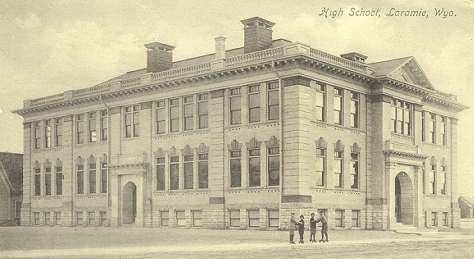
Laramie High School, 1914
In 1887 Laramie was designated as the home of the University of Wyoming. See pictures next page. By 1895 Laramie had attained
a population of over 6,000. Notwithstanding the University, Albany County remained a bit wild. In 1909, the Sheriff, Alfred H. Bath,
was killed near Woods Landing. His killer, George H. Sommers, was never caught.
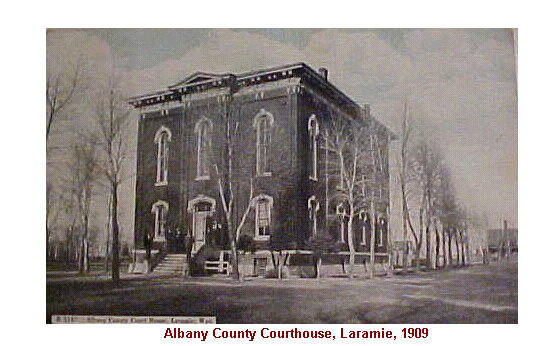
Laramie Photos continued on next page.
|